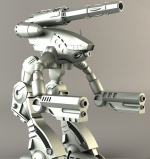Difference between revisions of "Bomb"
Chairkicker (talk | contribs) m (cleanup) |
Chairkicker (talk | contribs) m (→Cluster) |
||
| Line 173: | Line 173: | ||
| N/A (collision-based rather than distance) | | N/A (collision-based rather than distance) | ||
| --- | | --- | ||
| − | | | + | | 5 |
| 0 | | 0 | ||
| 500 | | 500 | ||
Revision as of 06:59, 22 September 2018
Bombs are a specialty weapon found only on certain subtypes of aerospace fighters (ASFs), namely the Attacker and Bomber variants. These weapons were first introduced in the 0.8.3 patch as a part of a general ASF update and replace the old Fire Bombs found in previous versions of the game. Bombs come in three different categories: high explosive, laser-guided and cluster.
High Explosive
High Explosive (HE) bombs are dumb-fire area-of-effect weapons that bear the most resemblance to the old Fire Bomb. They deal heavy damage to units caught within its blast radius, which is usually only wide enough to hit a single asset at a time. Of all the bombs, HE are the easiest to avoid and thus require some skill to score consistent hits, especially against a moving target.
| Max Range | Min Range | Ammo/ton | Heat | Damage | Damage Type | Secondary Damage | Secondary Damage Type | Splash Radius | Shots/min | Mech Damage/sec | Heat/sec | Ammo Cost/ton | Max Damage/ton Ammo | Notes |
|---|---|---|---|---|---|---|---|---|---|---|---|---|---|---|
| N/A (collision-based rather than distance) | --- | 1 | 0 | 400 | Kinetic | 400 | Missile | 15m / 25m | 12 | 160 | 0 | 2000 | 800 | Drops a single, unguided bomb |
Laser-Guided
Laser-guided (LG) bombs deal similar amounts of damage as HE bombs, but are capable of tracking a target that is painted with a TAG laser. When fired without TAG, LG bombs will instead free-fall, functioning like an HE bomb. As a result, these bombs are best used in conjunction with a teammate to take down priority targets and take some pressure off the bomber pilot by removing the need to precisely line up a strafing run.
| Max Range | Min Range | Ammo/ton | Heat | Damage | Damage Type | Secondary Damage | Secondary Damage Type | Splash Radius | Shots/min | Mech Damage/sec | Heat/sec | Ammo Cost/ton | Max Damage/ton Ammo | Notes |
|---|---|---|---|---|---|---|---|---|---|---|---|---|---|---|
| 1000m | 100m | 1 | 100 | 400 | Kinetic | 400 | Missile | 5m / 10m | 5 | 66.67 | 8.33 | 3000 | 800 | Fires a single, TAG-guided bomb |
Cluster
Cluster bombs (CL) are dumb-fired like their HE siblings, except have a far greater area-of-effect radius at the cost of direct damage. Instead of dropping a single bomb, cluster bombs are dropped as five bomblets at a time; spare clusters are then reloaded as separate payloads, if spares are available.
Cluster bombs are ideal for saturating a number of opponents in a confined space and performing area suppression/denial. With some skill, they can even be quite dangerous to single enemies as well. Cluster bombs are also highly potent against Battle Armor owing to their large splash radius, as their submunitions are strong enough to one-shot any BA caught outside of cover.
| Max Range | Min Range | Ammo/ton | Heat | Damage | Damage Type | Secondary Damage | Secondary Damage Type | Splash Radius | Shots/min | Mech Damage/sec | Heat/sec | Ammo Cost/ton | Max Damage/ton Ammo | Notes |
|---|---|---|---|---|---|---|---|---|---|---|---|---|---|---|
| N/A (collision-based rather than distance) | --- | 5 | 0 | 500 | Kinetic | 750 | Missile | 15m / 30m | 23.5 | 489.58 | 0 | 2500 | 1250 | Drops 5 unguided bomblets |
Canon
High-Explosive Bombs are one of several common bomb types that can be carried by aerospace and conventional fighters. They are typically carried on external hardpoints common to military aircraft.
Laser-Guided Bombs are a special type of High-Explosive Bomb which can be directed against a specific target through special equipment such as Target Acquisition Gear. They are typically carried on external hardpoints common to military aircraft.
Cluster Bombs are a special type of High-Explosive Bomb which can cause damage over a wide area. They are typically carried on external hardpoints common to military aircraft.
Usage
The following aerospace fighters equip these weapons.
| High Explosive (HE) | Laser-Guided (LG) | Cluster (CL) |
|---|---|---|
|
|
|
|
